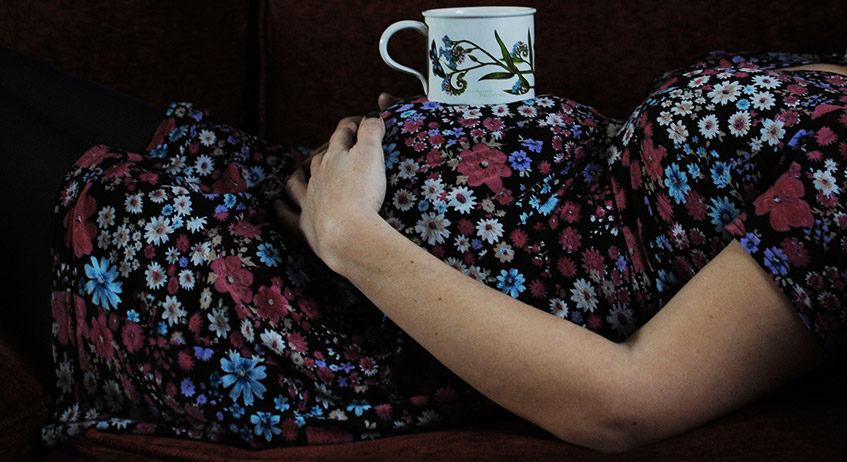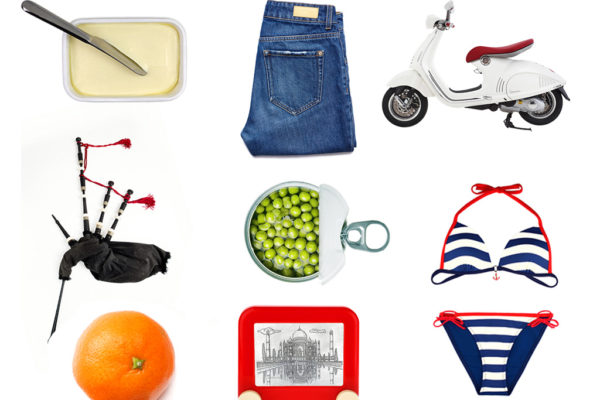
8 things no one tells you about being pregnant in France
Being pregnant is a special time in a woman’s life, full of excitement, joy and hope. But it can also be a period of anxiety about what the future will hold, and experiencing this while away from your home country can add to the uncertainty. Having had two babies in France, I wanted to share some of the ways pregnancy is different in France from the UK.
1. Pregnancies last one week longer in France.
Yay, an extra week of being pregnant! This is fabulous news for anyone who enjoys carrying a basketball in their stomach while being bloated and suffering from back pain. No one? Oh. Let’s be clear: the pregnancy itself isn’t actually longer, just the amount of time considered to be full term. In France they count 40 weeks and 6 days from the date of your last period to get your due date, whereas in the UK it’s 39 weeks and 6 days
Fun experiment time! If we go to babycentre.co.uk to use their online due date calculator, enter the period date as 1st January 2016, we are told to expect the baby on the 7th of October. Same exercise on the French site but the bébé will arrive on the 14th.

What does this mean for you if you’re pregnant? Well, you get used to telling people about your two due dates and can even have a bet on which country will get it right. For both my babies France was easily the winner. Bravo les médecines françaises !
2. There’s regular screening for toxoplasmosis.

Early on in your pregnancy you’ll give blood samples to check for infections like HIV and hepatitis, but also for a something called toxoplasmosis (toxoplasmose). This is a very common infection caused by a parasite carried in cats and rodents. Normally it causes no symptoms; in fact most people are unaware that they have it. Once the body has fought off the infection they become immune. So far, so good.
The problem arises when a woman is infected during her pregnancy. If this occurs, there’s a small risk she could pass the infection onto her baby, leading to serious developmental problems. At this point, if you’re at all concerned, please read this guide to toxoplasmosis in pregnancy on the NHS website.
Back again? Good. Toxoplasmosis can be contracted by eating infected meat that is raw or undercooked (thorough cooking kills the parasite), or through contact with faeces from an infected cat, for example. This is why we’re told to overcook meat ![]() and get someone else to clean the cat litter tray
and get someone else to clean the cat litter tray ![]() .
.
France is one of the few countries where pregnant woman are regularly screened for toxoplasmosis infection. If you aren’t immune you will have to do monthly blood and urine tests to check you haven’t become infected. This involves going along to your local laboratoire every month to pee in a tiny, tiny sample jar, then be poked with needles. I did it one Halloween’s Day where the person taking my blood was dressed as a vampire, I kid you not. And they say French people don’t have a sense of humour.
3. French people usually find out the sex of the baby before the birth.

There may be some French people who don’t find out if they’re going to have a little Fabien or Fabienne but I haven’t met them. The opposite is true in the UK. Try as I might, I can’t think of anyone who didn’t want to leave the surprise until the birth. Don’t panic if you’re in France and don’t want to know – you do have the option of saying “NO SPOILERS” to your doctor*.
*Although I did have one doctor (not my usual) doing a scan and saying “She’s growing well… OOPS! You did know already it’s a girl, right? LOL.”
4. French people can be very upfront and personal with their questions.
Colleague: “Did you plan to get pregnant?”
Me: “I’m so glad you asked! Funny story: we got drunk one night and one thing led to another…”
OK, I didn’t actually answer like that but I have been asked this question several times and at least once at work. Take a deep breathe, be polite and rant about it later to your partner/social media.
5. There isn’t a culture of drinking alcohol when pregnant.
There’s this perception that French woman (maybe Latin Europeans in general) drink alcohol while pregnant. This certainly hasn’t been my experience. If anything the medical establishment in France is far stricter on the subject, advising complete abstinence during pregnancy whereas in Britain, having one or two drinks on a special occasion is considered acceptable. So drink or don’t (inform yourself of the risks and make your own decision) but don’t expect to see bars full of pregnant women quaffing vin.
6. There are childbirth classes in France but not of the NCT kind.
I attended about 3-4 childbirth classes given by a midwife at the hospital where I was booked in to give birth. She was an adorable grandmotherly figure who bore more than a slight resemblance to Mrs Tiggy-Winkle. This, for some reason, made me feel at ease. Subjects covered included the stages of labour, pain relief, breathing exercises, birth complications, caring for a baby, caring for yourself (this is a big deal in France) and – yes! – breastfeeding.
Topics not included: ‘natural’ birth, by which I mean, for example, a birth without pain relief which takes place at home. Because this basically doesn’t exist in France except by accident. But more of that in part two where we’ll look at the birth itself.
The classes were all in French but my partner was on hand to do any translating required (I had only been in France for 2 years at this point) and Madame T-W considerately paused while this was going on. One time, however, she was talking about a medical complaint that can occur after the birth but my translator didn’t know the term in English. Madame Tiggy-Winkle and the rest of the group tried to explain, becoming increasingly frustrated, finally saying, “It’s a problem with your bum. They look like grapes!” Then I remembered sniggering over “grapes” in Viz comic as a teenager and shouted out, “Oh, you mean HAEMORRHOIDS!”
7. The standard time to stop work is 6 weeks before the birth.

You get 16 weeks maternity leave in France; that’s six before your due date and ten after. You can shift this to have three weeks before and 13 after, should you wish, but no more. Many women in Britain prefer to work as close to baby’s arrival as possible to have longer together afterwards, so this may come as a shock.
I definitely have more to say on the subject of maternity leave in France and its huge impact on things like breastfeeding and bonding, but more of that in part two when I look at childbirth and after.
8. Tests for Group B strep are standard.

Group B streptococcus is a bacteria that around a fifth of British women carry in their vagina. Most of the time it’s completely harmless and carriers usually don’t even know they have it. Problems may arise during childbirth, however, when Group B strep can be passed onto the newborn baby. Though rare, it causes infections in about 340 babies a year, leading to the death of around 10 otherwise healthy babies in Britain every year.
In France there’s a national screening programme to test for Group B strep (streptocoques B in French). During the eighth month of pregnancy a vaginal swab is taken to check for the presence of this bacteria. Women who have a positive result may be given antibiotics during the birth if they are judged to be at high risk of passing it onto the baby. Again I’m no medical expert but this seems to me to be A Good Thing and I’m glad I had this test in France.
If you’re interested in the subject, read about one British woman’s fight for Group B Step tests to be introduced in the UK after her son died from this preventable illness at just 9 days old.
Well that’s everything from me. If I had to sum up the difference between pregnancy in France and the UK I’d say there’s more medical surveillance in France and that it’s more demystified, in that French people want to know and share the gender and (in rare cases!) even circumstances of the conception. But this is just my view. I’d love to hear from anyone who’s experienced pregnancy and childbirth in France and/or the UK. Let me know your views (and if I’ve missed anything) in the comments.
Useful links
Message Paris – English-language support group for parents and parents-to-be. Packed with information about pregnancy.
Expatica – Information about medical examinations, your rights, legal aspects, etc.
French Entée – Fulsome sensible advice.
Image credits
Gender Revealing Party by Mack Male. CC BY
Spread ‘Em by Keturah Stickann. CC BY







Katharine
I’m a Brit, 39 weeks pregnant with my first baby having him in France (no effort was made to not show the penis in the ultrasound!). So happy to have found your site. Finally someone whose French pregnancy experience rings true with mine. I had the added stress of not getting healthcare until my 7th month so was travelling back to the UK every month for maternity care there doing a bit of compare and contrast. Any advice for a first time Mum with no connections (other than partner’s) and very limited French, would be greatly appreciated. I’m in the Paris region.